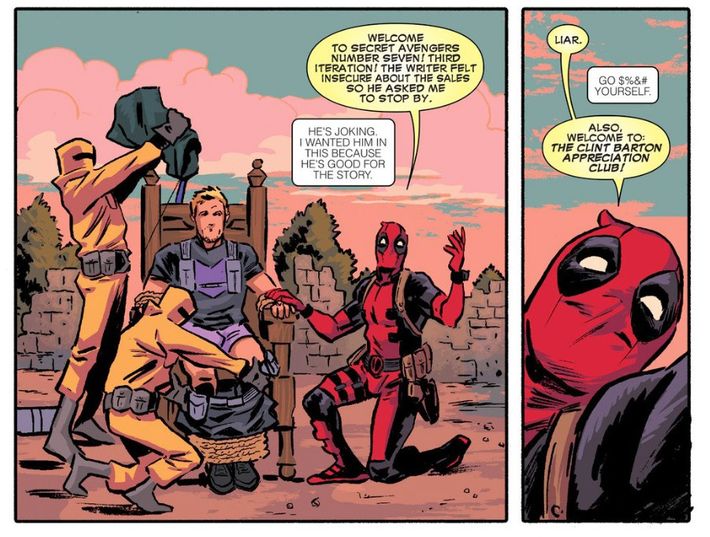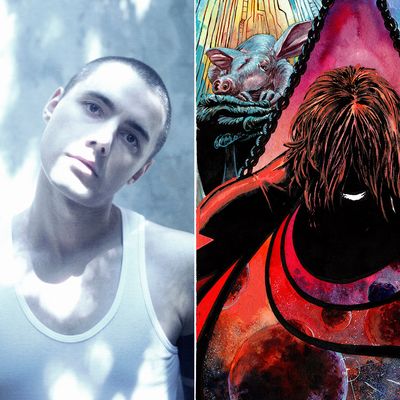
All it took was two years for Ales Kot to become omnipresent. The 27-year-old occult-loving, Czech-born writer has experienced a swift rise to prominence since his first published comic in 2012, making a mark at every major company. After short stints at DC Comics, Dark Horse Comics, and Valiant, Kot has taken the spotlight with a handful of major projects at Image and Marvel, all of which feature his memorably strange, reference-heavy mix of sci-fi and action. Although he swims in similar thematic waters as fellow comic-book mind-expanders like Grant Morrison, Warren Ellis, and Jonathan Hickman, his style has become increasingly unique as his career matures.
And right now, Kot is launching his highest-profile projects yet. He’s developing a TV adaptation of his hit sci-fi/espionage epic Zero, and he’s been tasked with writing the comics adventures of one of Marvel’s hottest cinematic properties in Bucky Barnes: The Winter Soldier. The monthly series debuts in October, and we have an exclusive look at the gorgeous first few pages of the first issue, drawn by artist Marco Rudy. The story will follow Bucky — portrayed by Sebastian Stan in this year’s box-office smash Captain America: The Winter Soldier — on a psychedelic journey as he becomes a cosmic assassin (Nick Fury was secretly playing that role up until recently). This comes in addition to his existing Marvel writerly duties on the acclaimed Secret Avengers and Iron Patriot.
Though very genial and intelligent, Kot is also a supremely odd man. He excitedly recalls his drug experiences, talks earnestly about trying to create entirely new art forms … and then there’s his appearance. His head is shaved, his pants are tight, his frame is wiry, and on the two occasions in which I’ve met him, his only upper-body clothing was a tight white undershirt. In other words, he looks like a skinhead, but you’ll never meet a more progressive, friendly, and open-minded skinhead than Ales Kot.
I met up with him to talk about the importance of Bucky Barnes, diversity in comics, and, to my surprise, ghosts. Right when we started chatting, I made an offhand joke about something (metaphorically) haunting me, and he immediately launched into tales of his encounters with the undead.
Have you been possessed before or something?
I’ve done stuff.
You’ve done stuff.
Twice. I can say definitely there was something else, like a visitor or whatever.
When?
First time, I’m sure of it, I was 21. I was in Prague, in this new apartment, and after I did some research into the apartment, I found out that this lady died there two months before.
You saw an apparition of this dead lady.
Like a straight-up person. It was really odd, fluorescent, sort of Medusa-like. Just in terms of what it looked like.
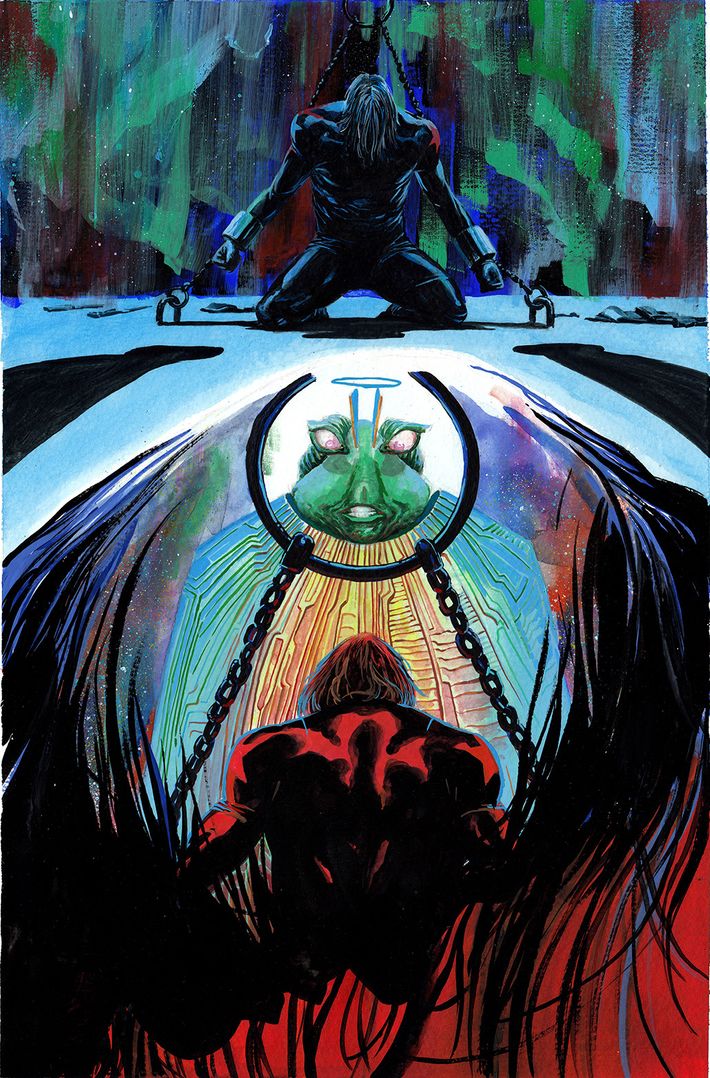
Did you talk to her?
No, fuck no. I was really fascinated and simultaneously scared shitless. It was incredibly odd. I spent a few hours working with it, trying to figure out what I saw. So, I saw her pace backwards and forwards, fall on the floor, and the funny thing is there was a carpet all over the floor they installed there. When I took out the carpet, there was this big fucking thing that looked like there was a puddle of something before. That was when I started thinking, Wait. I understand that this might be all about my Jungian shadow and this might be all a projection of my mind trying to make sense of something that’s actually completely inside me. And last year in November, I’m hanging out with a few friends in the woods in Europe, and I met this Lakota channeler who was in Europe.
You met a Native American shaman in Europe, of all places?
Yeah, I’m not joking. He’s a traveler. That’s how he was introduced to me. And that was a serious “black lodge turns into white lodge” experience. Straight-up. Man. It was amazing.
“It” being some kind of spirit, or what?
Yeah. Specifically Papa Guédé, the voodoo spirit.
Wait. So a Lakota shaman is with you, but you see a voodoo spirit.
Yeah.
And what does Papa Guédé say?
Well I didn’t really see it. It was just a voice in my head.
And what did the voice tell you?
It told me two things, and at first, I think I misinterpreted them because I heard them, and you will remember this [line of dialogue] from Secret Avengers.
What?
“A great culling is coming.” And the second sentence was, “Find a high place.” And I thought, Well, that probably means that something horrible is coming, in some ways. I’m talking to a friend from New Orleans two weeks ago, and he mentioned something that I was thinking about, but it was on the edges of my consciousness. I might have misinterpreted that. It might have been, “A great calling is coming, find a high place.” In the sense of, Hey, you are actually progressing, and you have to make sure that you’re ethically fully prepared and that you’re ethically making the right steps.
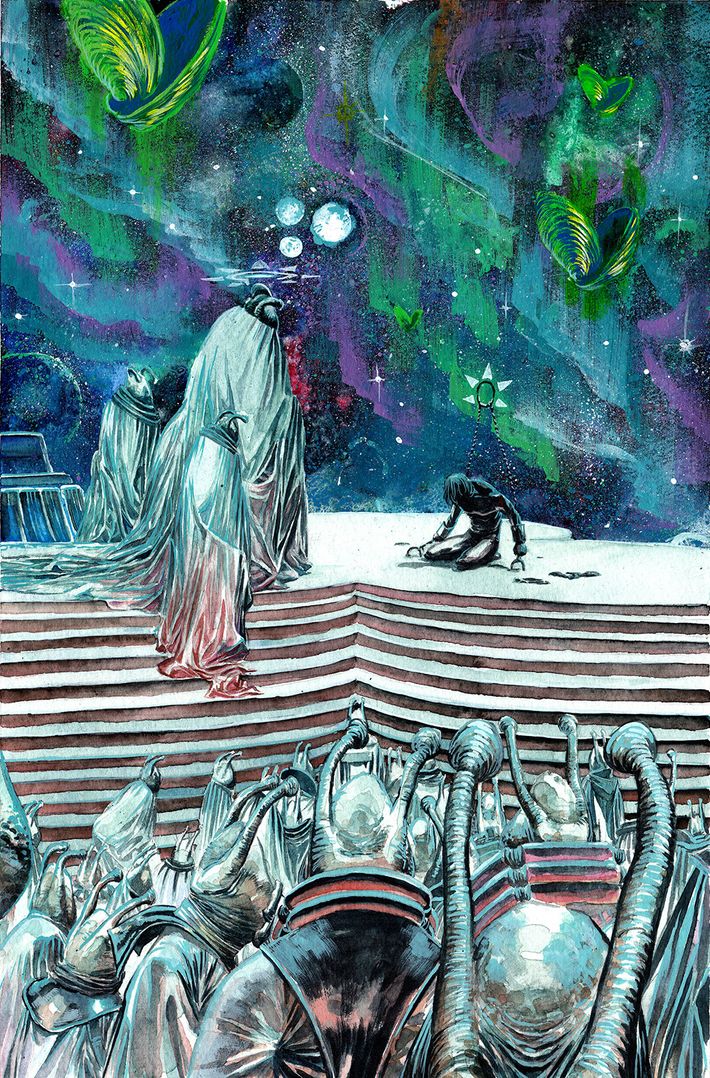
Speaking of Secret Avengers: Between that book and the upcoming Winter Soldier, you have the burden of writing a lot of characters that are huge among fans of the Marvel movie franchise. Do you feel constrained by having to write characters that are marketable properties?
The basic thing that I keep in mind when I’m working for any company where I don’t actually own the property is if there is someone who even theoretically or legally has the ability to make a decision that can change anything I’ve done creatively, inevitably, the constraints can come. The quality of my experience with Marvel is that I’ve never had to deal with that. However, there are certain things that I do keep in mind when writing. I don’t write from the point of making the characters marketable, because frankly, if I started giving a shit about that, I’d rather work in a factory. And I’ve worked in a factory. I’ve done shit jobs before. There are certain things that you can’t do, such as I believe that smoking is a no-no, I believe that bare breasts are a no-no if they are attached to a female body.
There are constraints like that, small ones. But however, when it comes to bigger ones, creatively, they’re letting me do whatever I want. They are very encouraging; they’re great editors in that they stay out of my way. But if they feel like something is not right, they tell me, and they tell me with reasons. And they come from a position of caring about the story and not from a position of second-guessing the audience for something external.
Why is Bucky relevant now? Ten years ago, this character had been literally and figuratively left for dead. Then writer Ed Brubaker brought him back in Captain America as this brainwashed assassin who’s had a rough road to recovery ever since.
Bucky came back to prominence as, I believe, we as a nation became more disillusioned with America. I believe that Captain America, as an archetype of the do-gooder, all-American boy that is very honest and very present and faces things straight-on, became this almost mythical ideal that he always in some sense was. We get to a place where generations, as they change, start realizing that Captain America is really a myth, and there are other people doing the dirty jobs that were happening.
Right, but disillusionment is nothing new. Why, right now, in 2014, does Bucky still matter?
What Bucky does is he takes over Nick Fury’s old job as the “man on the wall,” so to speak. On the wall between Earth and the rest of the galaxy. There are certain threats that come and have come close to Earth and might have done horrible things to us if Nick Fury weren’t there. And Nick Fury has done horrible, horrible things in order to protect us. At that scale, what I’m looking at is the same basic thing as the American narrative when it comes to the rest of the world. And the narrative is inevitably breaking and transforming into something hopefully more complex and more truthful. We’re all in this together.
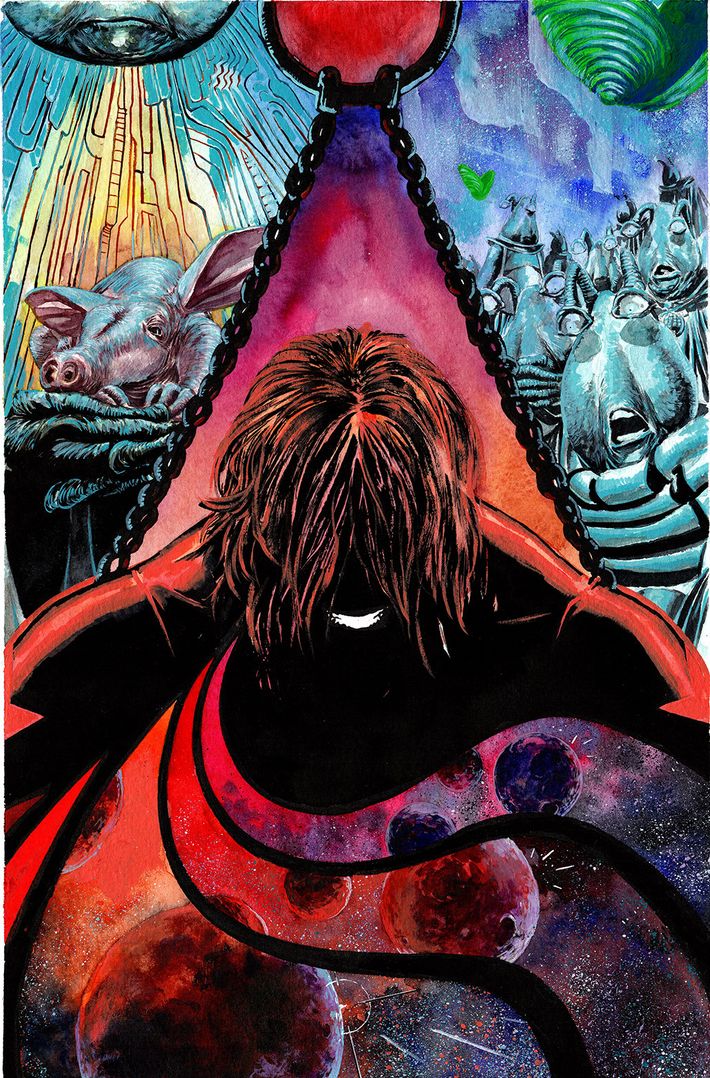
So, with Bucky becoming the new man on the wall, he is once again put in a position where he has his new job almost decided for him. It’s like, before they brainwashed you, you became the Russian spy/killer, then you were going to go work for Captain America because you felt like that was the only thing you could do. Now you’re going to be this because the other old white man died, and what does that mean for you? How do you deal with a job that you just get from someone else? How do you transform that job to fit who you are? What if you haven’t even decided who you really are in certain ways? How do you change as you travel through the galaxy on your missions? And you are facing things that you’ve never even conceived of in your mind before. What does that do to your mind and to the life of someone who gets something that is very black-and-white and straight-cut and realizes that there is much more to life than that?
So it’s, in some ways, a metaphor about trying to be a new kind of American in the world? One who doesn’t see the rest of the world as a threat, but more as an opportunity to learn?
You’re entirely correct. I never wanted to glorify war in the first place, and I believe I never did in anything I wrote. But now I’m getting from a place about war to places that are about much more. So, yeah, I’m doing that with Zero, and doing that with a completely different scale — an intergalactic scale — with Winter Soldier.
So, talking about Zero: Has Zero gone the way you planned, or has it—
[Laughs.]
You laughed, so I don’t think I even need to finish the question.
[Laughs.]
How much of a plan did you have going into Zero, and how much have you deviated from it?
How much of my life went as I planned it? Zero. [Laughs.]
Nice pun.
It’s interesting because there’s certain times when it feels like a necessity. Like, there are two ways of viewing the apocalypse: One is it’s something horrifying that’s going to fuck up your life, and the other is the original meaning of the word — change, unveiling. And I decided to just perceive it as that regardless of what happens in the world, as a process of change. And if I stay open to the process of change, I’ll actually use it as a gate towards creating something new out of it.
For example, in issue two, I miscalculated the amount of pages in that issue and we ended up having to add an extra page. But there was no time anyone could actually draw a page within those 24 hours or whatever, before we went to the printer. Because if I didn’t add the page, the page flow would be all wrong, and the big reveal on the last page would actually be on the right page, so you would see it coming. What we ended up with was I added a blank page and I wrote text on it, and that’s the page that is in issue three. And it ended up working perfectly!
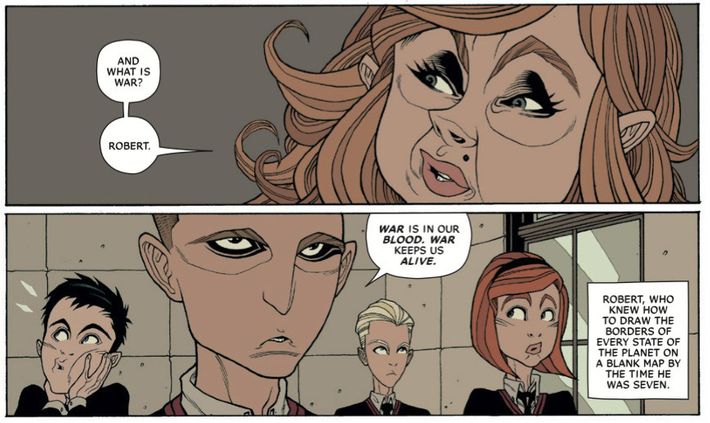
You’re very outspokenly progressive and political. Do you feel like the comics industry has a diversity problem?
I believe we can all do better. Being a white male in New York or in Western civilization, for that matter, makes me hella privileged. And to see women, to see African-Americans, to see people of different races, or even different religions, in some cases, make less money, have less opportunities, and not be given the same chances — that’s not the kind of world I want to live in on a daily basis. I will, but I will actively work towards changing that. The best way to change it for me is to ensure that I not only pick my collaborators carefully, but that my collaborators are compensated equally, that I push for that when I see somebody not being compensated equally, that I use characters that are not just white and not just male, but that really reflect the world that I live in.
And yet, in your biggest creator-owned project, Zero, the star is a white man. If these ideals are so close to your heart, why not have it be, say, a woman of color?
Hmm. Well, as for Zero not being African-American or a woman, I felt that I wasn’t quite ready to grapple with that narrative until I dealt with primary thoughts I had and feelings I had that I didn’t quite understand. Of masculinity and how to turn my own, as I call it, “bleak male war impulse.” Those with PTSD often talk about the “black thing” as something similar. I was grappling with how to deal with that and how to turn it into something positive and creative. And Zero was this process for me of simultaneously changing and transforming. What I read was inside me because as I was working on it, I came face-to-face with a lot of facts about my own family history. Simultaneously with that, there are advances in science that are starting to prove that we actually do have genetic memory that we carry.
And people in your family have suffered from PTSD?
Yes, I am certain of it. And I didn’t know until I really started to get into it. And as the things started floating up to the surface, I started realizing that even certain events in Zero are reflecting — not 100 percent reflecting, but there are certain similarities to certain traumas, and I was working through them and showing myself a way of changing them to something that can be more positive and more of a encouraging thing as opposed to just another war narrative about the glorification of a system that maintains that there’s such a thing as the “greater good.”
This is a minor thing, but I heard a rumor that, when you started writing Secret Avengers for Marvel, you wanted to make S.H.I.E.L.D. agent Phil Coulson gay. Is the rumor true?
No comment.
I figured that would be the answer.
However, I will say that I’ve read some rather great slash fiction where Coulson was definitely gay.
